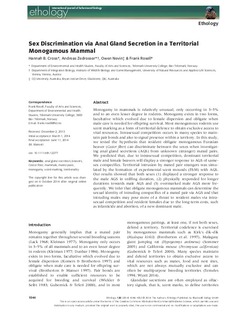| dc.contributor.author | Cross, Hannah | |
| dc.contributor.author | Zedrosser, Andreas | |
| dc.contributor.author | Nevin, Owen | |
| dc.contributor.author | Rosell, Frank | |
| dc.date.accessioned | 2014-12-27T08:25:33Z | |
| dc.date.accessioned | 2017-04-19T12:24:25Z | |
| dc.date.available | 2014-12-27T08:25:33Z | |
| dc.date.available | 2017-04-19T12:24:25Z | |
| dc.date.issued | 2014-07-12 | |
| dc.identifier.citation | Cross, H., Zedrosser, A., Nevin, O. & Rosell, F. Sex discrimination via anal gland secretion in a territorial monogamous mammal. Ethology. 2014, 120(10), p. 1044-1052 | |
| dc.identifier.issn | 1439-0310 | |
| dc.identifier.uri | http://hdl.handle.net/11250/2437936 | |
| dc.description.abstract | Monogamy in mammals is relatively unusual, only occurring in 3-5% and to an even lesser degree in rodents. Monogamy exists in two forms, facultative which evolved due to female dispersion and obligate when male care is needed for offspring survival. Most monogamous rodents use scent marking as a form of territorial defence to obtain exclusive access to vital resources. Intrasexual competition occurs in many species to maintain pair bonds and also to signal presence within a territory. In this study, we tested the hypothesis that resident obligate monogamous Eurasian beaver (Castor fiber) can discriminate between the sexes when investigating anal gland secretions (AGS) from unknown (stranger) mated pairs. We predicted that, due to intrasexual competition, dominant territorial male and female beavers will display a stronger response to AGS of samesex conspecifics. Territorial intrusion by mated pair strangers was simulated by the formation of experimental scent mounds (ESM) with AGS. Our results showed that both sexes (1) displayed a stronger response to the male AGS in sniffing duration, (2) physically responded for longer durations towards male AGS and (3) overmarked male AGS more frequently. We infer that obligate monogamous mammals can determine the sexual identity of intruding conspecifics of a mated pair via AGS and that intruding males may pose more of a threat to resident males via intrasexual competition and resident females due to the long-term costs, such as infanticide and abortion, of a new dominant male. | |
| dc.language.iso | eng | |
| dc.publisher | Wiley | |
| dc.rights.uri | http://creativecommons.org/licenses/by-nc-nd/4.0/ | |
| dc.subject | anal gland secretion | |
| dc.subject | beavers | |
| dc.subject | Castor fiber | |
| dc.subject | mammals | |
| dc.subject | mated pairs | |
| dc.subject | monogamy | |
| dc.subject | scent marking | |
| dc.subject | territoriality | |
| dc.title | Sex discrimination via anal gland secretion in a territorial monogamous mammal | |
| dc.type | Journal article | |
| dc.type | Peer reviewed | |
| dc.description.version | Published version | |
| dc.rights.holder | © 2014 The Authors | |
| dc.subject.nsi | 485 | |
| dc.identifier.doi | http://dx.doi.org/10.1111/eth.12277 | |

